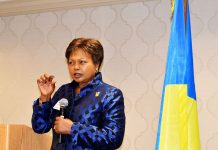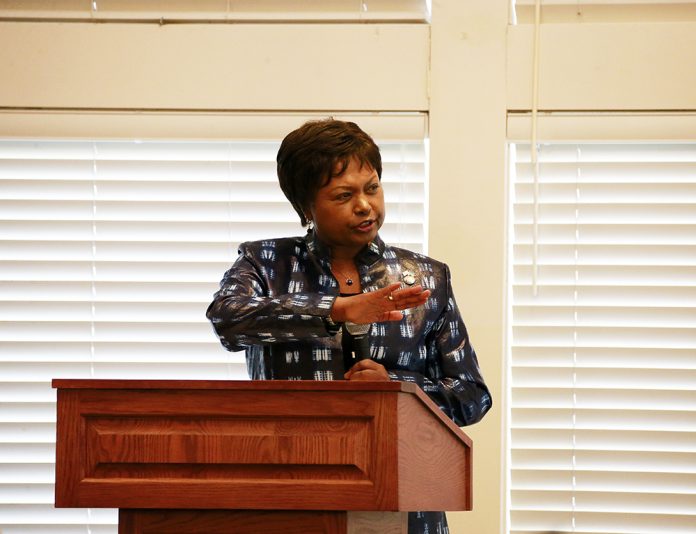
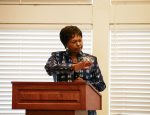
For children caught in the middle of the 1994 Rwanda genocide that killed over 800,000 people, a book in their hands made a world of difference. For the Rwandan ambassador to the United States, Mathilde Mukantabana, there were instances in her life during the genocide that the few books she could get hold of as she moved between countries as a refugee helped her see the light through the darkness. This was a reality for many, especially children, she said.
It is for that reason why she thanked the hundreds that attended a Friday May 10 luncheon, for their support and commitment to sending books to Africa. Ambassador Mukantabana, who serves as the deputy dean of the African Diplomatic Corps in Washington and one of about 30 women that are ambassadors in Washington, was addressing the annual Books for Africa fundraising luncheon.
“I always say Books for Africa is better than any kind of diplomacy you can build anywhere in the world,” she said. “When you bring someone a book it shows you care. It is better than any material good you can bring, give me a book as a gift and I will never forget, as you can always find happiness in a book. One thing that kept me alive as I went from one country to another (as a refugee), was always having a good book with you. It takes you to another universe away from the reality of war.”
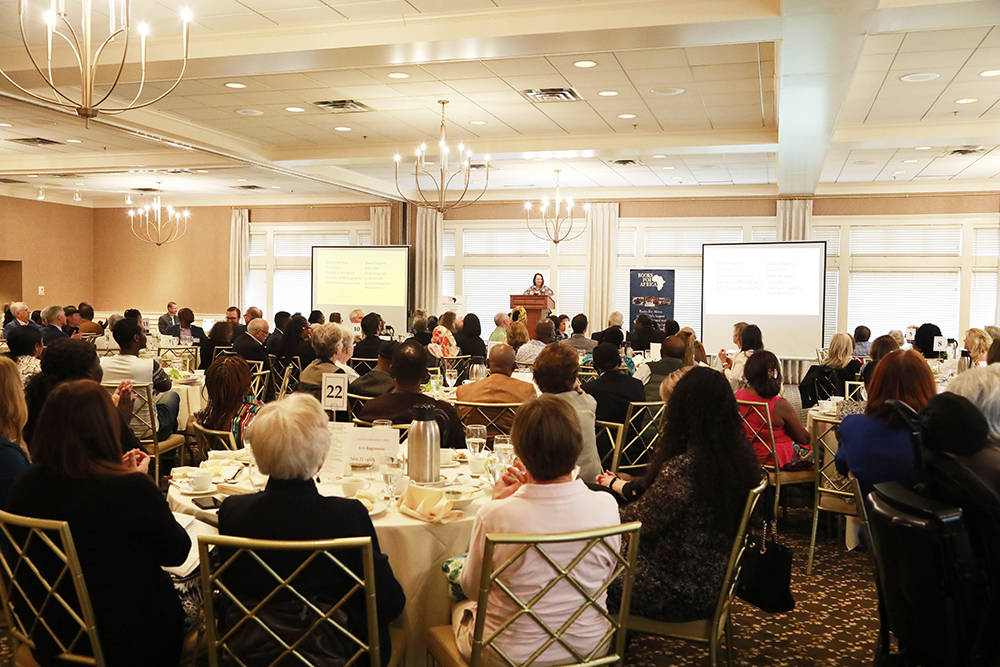
The St. Paul, Minn.- based Books for Africa organization has shipped over 60 million donated text books to all African countries since its founding, with over 3 million of those being sent last year. Computers and e-readers are now also routinely sent alongside the text books with BFA pointing out the donated electronics it sent to the continent in 2023 were loaded with over one million digital books.
“When you see those kids jumping, it is because when you see books it’s like seeing gold,” said Ambassador Mukantabana, referencing a BFA video showing joyful schoolchildren with boxes of books.
The World Population Review reports that 9 out of 10 least literate countries in the world are in the African continent. Only 67% of people in Sub-Saharan Africa can read and write, according to the World Bank.
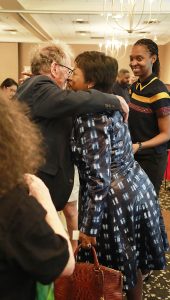
The post genocide outlook in Rwanda in terms of education has been one that has trended positive, but Ambassador Mukantabana, who addressed the crowd without written notes, said despite great investments in the sector by her government, more needs to be done and organizations such as Books for Africa are crucial in addressing unmet needs.
“One of the choices we have taken is what we call the strategy for transformation which is one of the visions we have for the country, and that strategy places literacy and education at the center and most of our budget is directed at that” she said. “So, Books for Africa has been a huge and fundamental, and I would say, critical partner in what we have been trying to do in our country.”
While the organization is known more for the shipment of books and computers for primary, secondary and college institutions, it has another high-profile mission of establishing law libraries in Africa. Known as the Law and Democracy Initiative, its inaugural co-chairs were the late U.S. Vice President Walter Mondale and UN Secretary-General Kofi Annan.
Thomson Reuters, one of the world’s largest legal book publishers, provides the books for the law libraries and since its launch has established 147 law libraries in 25 African countries. Books for Africa executive director Mr. Patrick Plonski announced at the luncheon that the American Bar Association (ABA) will be joining Thomson Reuters in sending law books through the initiative.
Mr. Bryan Kay, ABA’s director for publishing editorial and licensing, was at the luncheon representing his organization. Sitting at the same table with Mr. Kay was Ms. Dana Mitchell, representing the Minnesota Attorney General’s office. Ms. Mitchell is also the board president at the Minnesota Association of Black Lawyers.
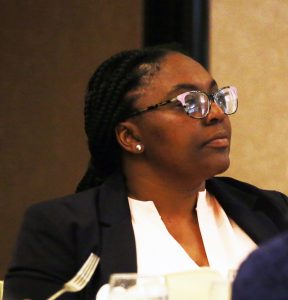
Ambassador Mukantabana while extolling the law and democracy initiative shared a light moment to demonstrate how in-demand the law books are, saying “my minister of justice said bring them to my office before you take them to the law school.”
In the audience sat Ms. Diane Moukouri, a Twin Cities businesswoman that owns B’beri Desserts. Ms. Moukouri, who is originally from Cameroon, was attending her first Books for Africa event. She was introduced to the organization during a recent Books for Africa warehouse visit by Zambia’s ambassador.
“I learnt during the visit that they do great work sending books and computers to Africa and I made up my mind that I need to get involved,” she said. “I got invited by Mark Ritchie (former Minnesota Secretary of State) to the luncheon and this is my opportunity to learn more.”
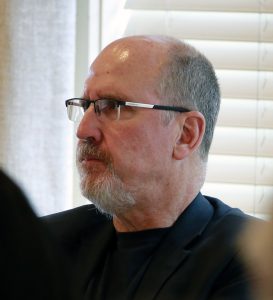
Unlike Ms. Moukouri, Mr. Bill Moran can no longer remember the number of times he has been to a Books for Africa event. A Twin Cities attorney, he was first introduced to the organization by his daughter-in-law who is the development director at Books for Africa.
His family has since become big supporters of charities operating in Africa.
“Since then, we have become big supporters of Books for Africa, and events like this give us an opportunity to learn of the progress it is making in addressing the need for books in the continent,” Mr. Moran said.
The organization said it raised over $170,000 at the luncheon.
About Tom Gitaa Gitaa, Editor-in-Chief
Born and raised in Kenya's coastal city of Mombasa, Tom is the Founder, Editor-in-Chief and Publisher of Mshale which has been reporting on the news and culture of African immigrants in the United States since 1995. He has a BA in Business from Metro State University and a Public Leadership Credential from Harvard’s Kennedy School of Government. He was the original host of Talking Drum, the signature current affairs show on the African Broadcasting Network (ABN-America), which was available nationwide in the United States via the Dish Network satellite service. On the show, he interviewed Nobel laureates such as 2004 Nobel Peace prize winner, Professor Wangari Maathai, the first woman from Africa to win the peace prize and heads of states. Tom has served and chaired various boards including Global Minnesota (formerly Minnesota International Center), the sixth largest World Affairs Council in the United States. He has previously served as the first Black President of the Board of Directors at Books for Africa. He also serves on the boards of New Vision Foundation and the Minnesota Multicultural Media Consortium. He has previously served two terms on the board of the United Nations Association. An avid runner, he retired from running full marathons after turning 50 and now only focuses on training for half marathons.
- Web |
- More Posts(455)




